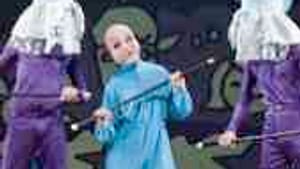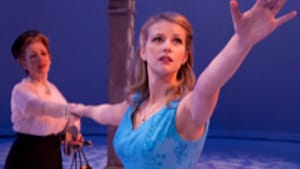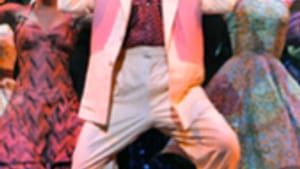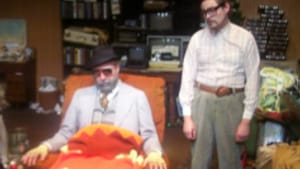Theater
2856 results
Page 251

"Harold and the Purple Crayon' at the Prince
Imagination triumphs again
Crockett Johnson's 50-year-old paean to the childish imagination is well served here. Every kid's attention was focused raptly on the stage, thanks to a remarkable non-stop combination of music, dance, animation and puppetry.
Articles
3 minute read

"Ragtime' revived in New York (1st review)
A second chance for Ragtime
The new budget-minded revival of Ragtime is apt and, in some scenes, provides more clarity than the 1998 original. But one particular economy disturbs me.
Articles
4 minute read

"boom' by Flashpoint Theatre
The end of the world (and a better idea)
Biology nerd meets nihilist, comet meets planet, and there's a middle-aged woman pulling the levers. Peter Sinn Nachtrieb's boom is often very funny, but the credit belongs to the actors, not his pretentious script.
Articles
4 minute read

Who should play Helen Keller?
Blind actors and blind alleys: Who should portray Helen Keller?
Inclusivity advocates are up in arms because a sighted, hearing celebrity actress has been hired to portray the blind and deaf Helen Keller in The Miracle Worker. They say they're concerned about creating better art, but their logic suggests otherwise.
Articles
5 minute read
Sign up for our newsletter
All of the week's new articles, all in one place. Sign up for the free weekly BSR newsletters, and don't miss a conversation.

Jude Law as "Hamlet' on Broadway
Our latest Hamlet: What a piece of work is Jude Law
Jude Law, the latest in a seemingly endless line of Hamlets, is a deeply emotional Hamlet who wears his heart on his sleeve, holding nothing back. In the process he brings out all the colors and complexities of what it means to be a man today, or any day.
Articles
5 minute read

"Light in the Piazza' by PTC (2nd review)
An emotional Renaissance
This first-rate adaptation of Elizabeth Spencer's novella combines elements that are more original, sensitive, personal, even courageous than we're accustomed to find in musical theater. But The Light in the Piazza suffers from two serious flaws.
Articles
4 minute read

"Light in the Piazza' by PTC (1st review)
Hope vs. fear in Florence
The Philadelphia Theatre Company's version of The Light in the Piazza is a unique accomplishment, adapting the look of New York's spacious Lincoln Center production to a smaller stage. It's a great re-interpretation of a gentle musical about fragile people.
Articles
4 minute read

"Oliver' at the Walnut
Oliver and Broadway's underdog ennoblement schtick
What is it that attracts Broadway musicals to urban poverty? Great performances can cover a multitude of sins. But with merely competent performances, like those in this production of Oliver, you begin to notice cracks in the show's underlying structure.
Articles
5 minute read

"Memphis' on Broadway
Love, sex, race and the birth of rock & roll
In the ingenious and lively Memphis, a white radio DJ falls in love with the music of his soul, and with the African-American woman singing it. These two rich characters from the ‘50s and their equally rich music crystallize the role played by rock n' roll in the downfall of racial segregation.
Articles
4 minute read

Beckett's "Endgame' by EgoPo (3rd review)
Beckett's vision, expanded
Purists object to setting a European work like Endgame in a cluttered South Jersey basement. But EgoPo's idiosyncratic interpretation brings a fresh vision to Beckett's classic: It's no longer about post-nuclear holocaust but foremost a personal play of family relationships gone to rot but still clinging.
Articles
5 minute read